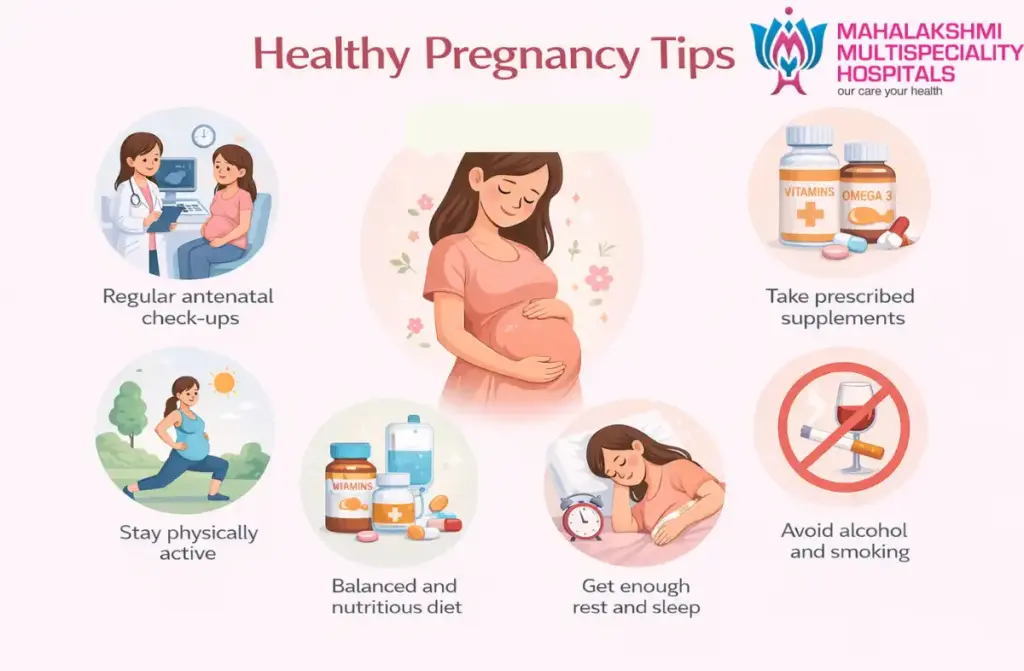A healthy pregnancy is one where both the mother and baby thrive physically, emotionally, and mentally from conception to delivery. It involves balanced nutrition, regular prenatal care, and lifestyle choices that support fetal development and maternal well-being. Every stage requires mindful attention to physical changes, mental health, and medical guidance. Following proven healthy pregnancy tips can reduce risks, ease discomfort, and promote a smooth journey to childbirth. From managing morning sickness to staying active and informed, small steps contribute to a safer, more empowered pregnancy experience.
Always Schedule Regular Prenatal Checkups
Regular prenatal checkups are essential for ensuring both the mother’s and baby’s well-being throughout pregnancy. These visits help monitor the progress of the pregnancy, identify any potential issues, and provide guidance on maintaining a healthy lifestyle.
- Monitor Fetal Growth and Development: Regular checkups allow your doctor to track the baby’s growth, check the heartbeat, and assess the development of key organs. This can help detect early signs of potential complications, such as low birth weight or developmental delays.
- Early Detection of Health Risks: Healthy Pregnancy Tips Routine screenings and tests during these visits can identify health risks like gestational diabetes, preeclampsia, or anemia. Catching these conditions early allows for timely treatment to minimize harm to both mother and baby.
- Maintain a Healthy Diet and Lifestyle: During prenatal visits, doctors offer guidance on maintaining a healthy pregnancy diet and lifestyle. They provide personalized tips for healthy eating, managing weight gain, and staying active, which are all crucial for a healthy pregnancy.
- Address Emotional Well-being: Pregnancy can be a time of emotional and physical changes. Regular checkups provide an opportunity to discuss mental health concerns, such as anxiety or depression, ensuring both the mother’s and baby’s emotional well-being are supported.
- Monitor Early Pregnancy Symptoms: In the first trimester, it’s important to have regular checkups to ensure any discomfort, such as nausea or fatigue, is within the expected range. Your healthcare provider can offer advice on managing these early pregnancy symptoms effectively.
Keep a Balanced Diet to Maintain a Healthy Pregnancy
Maintaining a balanced diet during pregnancy is crucial for both the mother’s health and the baby’s development. A nutritious, well-rounded diet helps ensure that the baby gets all the necessary nutrients for growth while supporting the mother’s energy levels and overall well-being.
- Prioritize Nutrient-Dense Foods: Focus on incorporating a variety of fruits, vegetables, whole grains, and lean proteins into daily meals. These foods provide essential vitamins, minerals, and fiber that are important for the baby’s development and help prevent common pregnancy discomforts such as constipation.
- Incorporate Protein for Growth: Protein is vital for fetal tissue growth, including the brain and muscles. Healthy sources like lean meats, fish, eggs, beans, and legumes should be consumed regularly to support both maternal and fetal health.
- Choose Healthy Fats: Healthy fats, such as those found in avocados, nuts, seeds, and olive oil, are essential for brain development and the absorption of fat-soluble vitamins like vitamin D. These fats also help maintain hormone balance and provide long-lasting energy during pregnancy.
- Ensure Adequate Calcium and Iron Intake: Calcium supports the development of the baby’s bones and teeth, while iron helps prevent anemia, a common condition during pregnancy. Dairy products, leafy greens, fortified cereals, and beans are excellent sources of both minerals.
- Stay Hydrated: Drinking plenty of water is essential to support amniotic fluid levels, digestion, and the body’s increased blood volume during pregnancy. Proper hydration also helps reduce the risk of common pregnancy issues like swelling and urinary tract infections.

Eat the Proper Amount of Calories
Monitoring calorie intake is one of the most important healthy pregnancy tips, as both under-eating and overeating can affect the baby’s development. Caloric needs vary by trimester, High risk pregnancy making it crucial to adjust intake as the pregnancy progresses. Following first trimester tips healthy pregnancy helps establish balanced habits early, while later stages require a gradual increase in calories to support fetal growth.
- Adjust Caloric Intake Based on Trimester: In the first trimester, additional calories are typically not required, as the baby is still in the early stages of development. However, in the second and third trimesters, a gradual increase of around 300–350 extra calories per day can support the growing baby and the mother’s increased energy needs.
- Focus on Nutrient-Rich Calories: Choose calories that come from whole, tips for healthy baby during pregnancy nutrient-dense foods such as lean proteins, whole grains, healthy fats, and plenty of fruits and vegetables. These foods provide essential vitamins and minerals, supporting both the baby’s development and the mother’s health, rather than empty calories that offer little nutritional value.
- Avoid Overeating: While you may feel hungrier during pregnancy, it’s important to avoid overeating or indulging in unhealthy, high-calorie foods. Gaining weight too quickly can lead to complications such as gestational diabetes or excessive weight gain, which may be harmful to both the mother and baby.
- Listen to Your Body’s Hunger Cues: Pay attention to your body’s natural hunger signals, eating when you’re hungry and stopping when you’re satisfied. Healthy Pregnancy Tips Consuming balanced, smaller meals throughout the day helps regulate calorie intake while keeping energy levels steady, preventing overeating and excessive weight gain.
- Track Nutritional Balance Over Calories: Instead of focusing solely on calorie count, ensure your diet is well-balanced with a proper mix of protein, healthy fats, carbohydrates, and fiber. This balanced approach helps maintain a steady and healthy pregnancy weight gain while providing the baby with essential nutrients for optimal development.
Take Prenatal Supplements
Taking prenatal supplements is an essential part of maintaining a healthy pregnancy, especially when dietary intake alone may not meet all nutritional needs. These supplements support fetal development and maternal health, filling in any nutritional gaps that might arise during different stages of pregnancy.
- Ensure Sufficient Folic Acid Intake: Folic acid is critical during the first trimester, as it helps prevent neural tube defects like spina bifida. It’s recommended that pregnant women take at least 400–600 micrograms daily, making it one of the most important first trimester tips for healthy pregnancy.
- Support Bone and Teeth Development with Calcium and Vitamin D: These nutrients work together to develop the baby’s bones and teeth while also protecting the mother’s bone density. Calcium-rich foods should be paired with supplements, especially if dairy intake is low, to meet the recommended daily levels.
- Prevent Anemia with Iron Supplements: Iron supports the increased blood volume during pregnancy Healthy Pregnancy Tips and helps deliver oxygen to the baby. Many pregnant women require supplemental iron, especially in the second and third trimesters, to avoid fatigue and low birth weight risks.
- Include DHA for Brain Development: DHA, an omega-3 fatty acid, plays a vital role in the development of the baby’s brain and eyes. While it can be found in fatty fish, prenatal supplements often include DHA to ensure consistent intake, especially for mothers who consume little seafood.
- Choose a Supplement That Complements a Balanced Diet: Prenatal vitamins are not substitutes for healthy eating but are part of broader healthy diet tips for pregnancy. Selecting a supplement that includes a full spectrum of essential nutrients ensures both mother and baby receive optimal support for each stage of development.
Exercise Tips to Stay Active During Pregnancy
Staying physically active during pregnancy offers numerous benefits for both the mother and the developing baby. Regular, safe exercise supports physical health, boosts mood, and can even ease labor and recovery, healthy diet tips for pregnancy making it an essential component of Healthy Pregnancy Tips.
- Consult Your Healthcare Provider First: Before beginning any exercise routine, it’s important to receive medical clearance, especially if there are pre-existing conditions or pregnancy complications. Healthy Pregnancy Tips This ensures that the activity plan aligns with your stage of pregnancy and personal health needs.
- Incorporate Low-Impact Aerobic Exercises: Activities such as walking, swimming, and prenatal yoga are excellent for cardiovascular health without putting strain on the joints. These exercises support circulation, reduce swelling, and improve overall endurance, which can be helpful during labor.
- Strengthen Core and Pelvic Muscles: Gentle strength training and targeted exercises like pelvic tilts and Kegels help support the uterus and reduce lower back pain. Strengthening these areas also aids in posture, Healthy Pregnancy Tips which becomes increasingly important as the pregnancy progresses.
- Stay Hydrated and Avoid Overheating: During physical activity, tips for healthy baby during pregnancy it is vital to drink plenty of water and avoid overheating, especially in the first trimester. These precautions help prevent fatigue and support a safe environment for fetal development, making them essential first trimester tips healthy pregnancy.
- Listen to Your Body and Modify When Needed: Pregnancy changes balance, energy levels, and flexibility, so it’s important to adjust your routine accordingly. Stop exercising if you feel dizzy, short of breath, or experience pain, and healthy diet tips for pregnancy focus on consistency rather than intensity throughout each trimester.
What to Avoid during Exercising?
Understanding what to avoid during pregnancy workouts is just as important as knowing what exercises are beneficial. Being aware of these precautions helps prevent injury, ensures the baby’s safety, Healthy Pregnancy Tips and supports a smooth pregnancy journey.
- Avoid High-Impact or Contact Sports: Activities like basketball, soccer, skiing, or horseback riding pose a high risk of falls or abdominal trauma. These types of exercises are unsafe during pregnancy and should be replaced with low-impact alternatives that align with Healthy Pregnancy Tips.
- Do Not Lie Flat on Your Back After the First Trimester: Lying flat can compress a major vein (the vena cava), which may reduce blood flow to the heart and baby. Instead, tips for healthy baby during pregnancy choose positions that support proper circulation, especially in the later stages of pregnancy.
- Stay Away from Exercises That Overheat the Body: Hot yoga, intense cardio in hot weather, or poorly ventilated spaces can raise core body temperature excessively. Overheating, particularly in the first trimester, Healthy Pregnancy Tips can interfere with fetal development, making it one of the key first trimester tips healthy pregnancy.
- Avoid Holding Your Breath During Workouts: Breath-holding can restrict oxygen flow to both you and your baby, especially during strength training or stretching. Always practice steady, controlled breathing to maintain oxygen balance throughout the activity.
- Do Not Push Through Pain or Exhaustion: Pregnancy is not the time to push physical limits. Any sign of dizziness, chest pain, cramping, or bleeding should signal immediate cessation of exercise and medical consultation, reinforcing safe and mindful movement.
Conclusion
A healthy pregnancy is built on simple but important choices such as balanced nutrition, safe exercise, and proper rest. Staying active with gentle movements like walking or yoga supports circulation and comfort, while avoiding overexertion protects both mother and baby. tips for healthy baby during pregnancy Nutritious meals rich in fruits, vegetables, and proteins provide the energy and vitamins needed for growth and strength. Equally, managing stress and getting adequate sleep help maintain overall well-being. By following these healthy pregnancy tips consistently, mothers can create a safe and nurturing environment, laying the foundation for a smooth pregnancy and a strong start for their baby.
Read also: Skin Diseases Treatment






